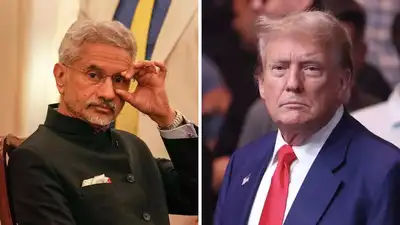Jaishankar's Presence: A Measured Response to Trump's Inauguration

Hire Arrive
News
about 1 year ago

As the world tuned in to witness the swearing-in of Donald Trump for his second term as the 45th President of the United States, a notable presence stood out among the international dignitaries—Dr. S. Jaishankar, India's External Affairs Minister. His attendance at the inauguration was more than just a diplomatic gesture; it represented a nuanced approach to India's foreign policy under Prime Minister Narendra Modi's leadership, balancing strategic interests with diplomatic tact.
A New Era in Indo-US Relations
The United States and India have historically shared a complex relationship, marked by both cooperation and divergence. While the two nations have collaborated extensively on issues ranging from defense and security to trade, there have been moments of tension—particularly regarding trade agreements, tariffs, and geopolitical challenges, especially in Asia. With Trump assuming office, India faced a diplomatic balancing act: how to engage with a leader whose policies were often unpredictable, yet one who had positioned himself as a staunch ally of India.
Dr. Jaishankar’s presence at the inauguration underscored India’s desire to maintain and further strengthen its relationship with the United States. The Modi administration, under Jaishankar’s stewardship, has been keen on advancing ties with the U.S., especially in the areas of defense cooperation, counter-terrorism, and economic partnership.
Diplomatic Nuance: The Importance of Jaishankar's Role
Dr. Jaishankar, a seasoned diplomat with years of experience in shaping India's foreign policy, is seen as the perfect representative for such an occasion. Having served as India's Ambassador to the United States from 2013 to 2015, Jaishankar's understanding of the American political landscape, his ability to manage relationships, and his nuanced approach to foreign policy makes him a key figure in maintaining a steady course in India-U.S. relations.
Jaishankar's presence was symbolic, signaling India's intention to continue fostering a close partnership with the United States. However, it also reflected a careful approach to diplomacy, recognizing the importance of engagement without appearing overly deferential. His participation in the inauguration was not just about attending a ceremonial event, but rather about ensuring that India remained at the forefront of global geopolitics, particularly in a region that is seeing increasing tensions with China and the Indo-Pacific's growing strategic significance.
The Strategic Significance of Trump's Inauguration
Trump’s second inauguration was an important milestone in U.S. politics, but it also marked a critical juncture for Indo-U.S. relations. With tensions rising between the U.S. and China, both nations were strategically positioned to cooperate more closely in regional security matters. India’s involvement in this partnership was seen as crucial, especially given the increasing challenges posed by China’s growing influence in the Indo-Pacific region.
Jaishankar’s presence was a way to signal to the U.S. that India was willing to play a proactive role in the emerging global order. The United States and India have shared concerns over China’s territorial ambitions in the South China Sea, as well as its increasing military presence in the region. In this context, Jaishankar’s participation in the inauguration was not only a show of goodwill but also an indication of India’s interest in maintaining a strong, strategic relationship with the U.S.
Balancing Diplomacy and Domestic Interests
While Jaishankar’s presence at Trump’s inauguration was a significant diplomatic move, it also needed to be understood in the context of domestic politics. India’s foreign policy is deeply intertwined with its domestic priorities, and the Modi government has placed a strong emphasis on strengthening ties with major world powers, especially the United States, Japan, and Australia. These partnerships are critical to India’s aspirations of being a leading player in the global order.
Furthermore, Jaishankar's measured response to the inauguration event reflects India's broader approach to foreign policy—maintaining strategic autonomy while forging important partnerships across the world. By attending the inauguration, India reaffirmed its commitment to the United States while simultaneously asserting its independence in navigating the global stage.
Looking Ahead: Indo-U.S. Relations Under Biden and Beyond
Although Jaishankar attended the inauguration of Donald Trump, the incoming administration under Joe Biden has its own set of challenges and opportunities for India. With Biden’s emphasis on climate change, human rights, and multilateralism, India will need to engage with the new president to ensure that the bilateral relationship continues to grow in areas that benefit both nations.
India’s position will likely continue to focus on strategic defense cooperation, economic partnerships, and regional security in the Indo-Pacific. Jaishankar’s diplomatic acumen will be critical in maintaining a steady course during this transition, ensuring that India’s interests are preserved while adapting to changing global dynamics.